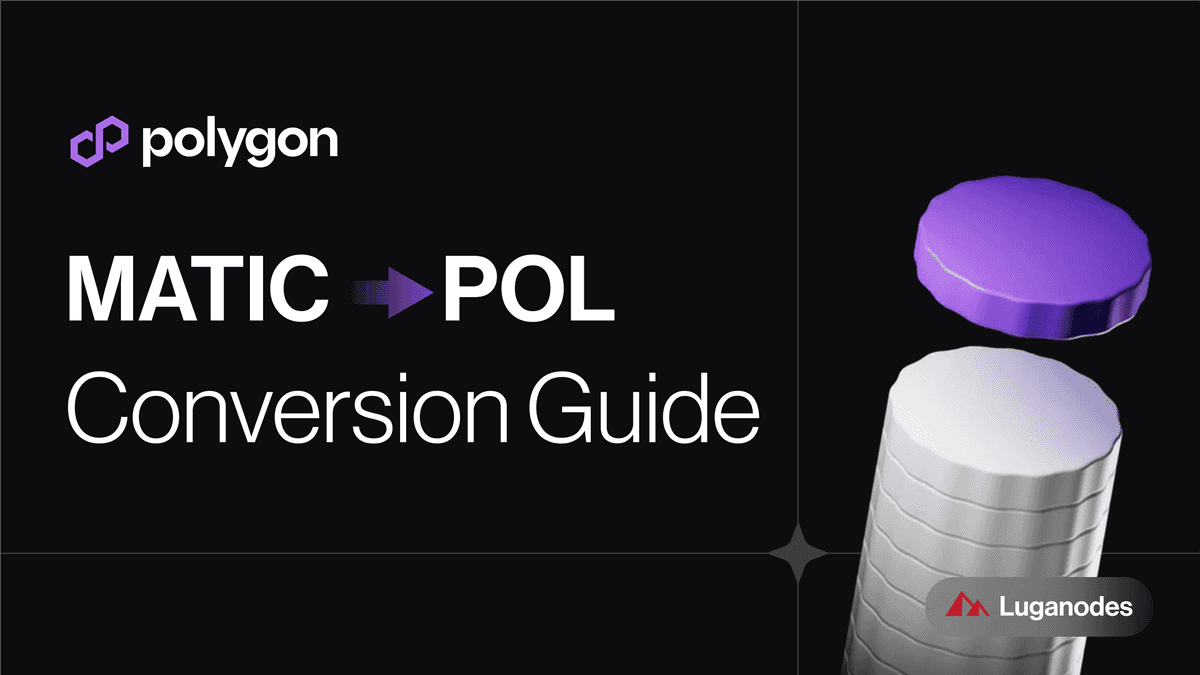4 min read
MATIC to POL Conversion Guide
Step-by-Step Upgrade to POL!

Introduction
Polygon initiated its upgrade from MATIC to POL on September 4th. This upgrade marks a significant step in Polygon’s journey toward becoming an aggregated network of blockchains.
Once this 1:1 upgrade from MATIC to POL is completed, POL will become a hyperproductive token, serving as the native gas and staking token on Polygon PoS. In the initial phase, POL succeeds MATIC in this role. In subsequent phases, POL will also play a crucial role in the AggLayer.
This update from MATIC to POL has been designed to be seamless. In this guide, we address various scenarios with a case-by-case breakdown, ensuring you understand what actions, if any, are required for the token change.
Case-by-Case Guide for MATIC to POL Conversion
1. MATIC Staked with Validator on Polygon PoS
-
Action Needed: None
-
Details: Automatically converts to staked POL on September 4th, continuing to earn rewards in POL. Ensure that your wallet's RPC settings are updated to reflect "POL" as the new token symbol.
2. MATIC Staked with Validator on Ethereum
-
Action Needed: None, unless users prefer not to convert
-
Steps: If you do not want your staked MATIC to convert to POL, unstake by September 1st.
-
Details: The conversion to POL will proceed unless unstaked. Rewards will continue post-upgrade.
3. MATIC on Polygon PoS (Wallet)
-
Action Needed: None
-
Details: All MATIC on Polygon PoS will automatically upgrade to POL. If RPC settings in the wallet aren’t updated, "MATIC" might still display instead of "POL."
4. MATIC on Ethereum (Wallet)
-
Action Needed: Manual Migration, check the steps in the section below.
-
Steps: Upgrade via the Polygon Portal or by calling the migration() function on the migration smart contract. Direct token sending to the contract address will result in loss of funds.
5. MATIC on Polygon zkEVM
-
Action Needed: Optional
-
Steps:
-
Option 1: Bridge MATIC to Ethereum, then use the Polygon Portal for the upgrade. Manual Migration steps are mentioned in the next section.
-
Option 2: Use a zkEVM-based DEX or DEX aggregator to swap MATIC for POL.
6. MATIC on Centralized Exchange (CEX)
-
Action Needed: Follow CEX instructions
-
Details: Exchanges will usually handle the upgrade automatically. Users should check their exchange’s FAQ or support for guidance.
7. MATIC in Smart Contracts (Polygon PoS)
-
Action Needed: None
-
Details: Smart contracts will automatically convert to POL; no changes are needed from contract users or owners.
8. MATIC in Smart Contracts (Ethereum)
-
Action Needed: Manual Migration, check the steps in the section below.
-
Details: Upgrade via the Polygon Portal or use the migration contract directly to upgrade MATIC in Ethereum smart contracts.
9. DeFi Protocol Users on Polygon PoS
-
Action Needed: None
-
Details: Liquidity pools will automatically switch from MATIC to POL. Developers may update front-end references to POL.
11. Liquid Staking Users
-
Action Needed: Different programs have varying processes.
-
Details: Check with your liquid staking provider.
Step-by-Step Guide for Converting MATIC to POL Manually on Ethereum
Step 1: Access the Polygon Portal
Go to the Polygon Portal. Ensure your wallet is connected and has MATIC tokens as well as some ETH for gas fees.

Step 2: Select the Conversion Amount
Choose the amount of MATIC you want to convert and click on Upgrade.

Step 3: Approve the Transaction in Your Wallet
You’ll be redirected to your wallet (e.g., MetaMask). Approve the spending cap request by clicking on Next.

Step 4: Confirm the Fee
Approve the spending cap fee by clicking on Approve.

Step 5: Wait for Submission
Your spending cap fee transaction will be submitted. Please wait for confirmation.

Step 6: Confirm the MATIC to POL Conversion
Once the spending cap transaction is confirmed, verify the exchange of MATIC to POL and the associated fee. Click on Confirm.

Step 7: Transaction Successful
You will receive a confirmation window stating that the transaction was successful. You can track your transaction on Etherscan if needed.

Conclusion
By following this guide, you can ensure a smooth transition from MATIC to POL, regardless of the scenario you are in. Stay updated through official channels to manage your tokens with ease.
About Luganodes
Luganodes is a world-class, Swiss-operated, non-custodial blockchain infrastructure provider that has rapidly gained recognition in the industry for offering institutional-grade services. It was born out of the Lugano Plan B Program, an initiative driven by Tether and the City of Lugano. Luganodes maintains an exceptional 99.9% uptime with round-the-clock monitoring by SRE experts. With support for 45+ PoS networks, it ranks among the top validators on Polygon, Polkadot, Sui, and Tron. Luganodes prioritizes security and compliance, holding the distinction of being one of the first staking providers to adhere to all SOC 2 Type II, GDPR, and ISO 27001 standards as well as offering Chainproof insurance to institutional clients.
The information herein is for general informational purposes only and does not constitute legal, business, tax, professional, financial, or investment advice. No warranties are made regarding its accuracy, correctness, completeness, or reliability. Luganodes and its affiliates disclaim all liability for any losses or damages arising from reliance on this information. Luganodes is not obligated to update or amend any content. Use of this at your own risk. For any advice, please consult a qualified professional.